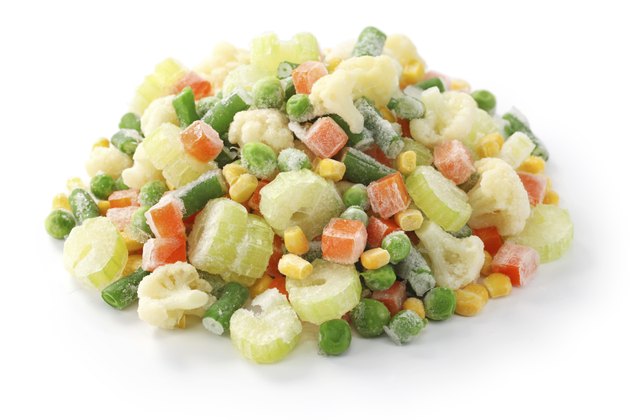
Frozen mixed vegetables are simple and convenient to prepare. They are a healthful way to keep your vegetable intake up during the winter when fresh produce is not as readily available. Most mixed vegetables include corn, peas, green beans and carrots. Use frozen mixed vegetables to prepare pot pies, soups, stews or serve as a side with your favorite steak or chicken dish.
Vitamin A
With 7,211 IU per 5-oz. serving, frozen mixed vegetables are a good source of vitamin A. Getting adequate amounts of vitamin A supports the production of white blood cells that fight invading bacteria and viruses that cause various illnesses. Vitamin A also plays a role in cell division, the growth of your bones, reproduction and eyesight. The daily intake recommendations are 2,310 IU for women and 3,000 IU for men, making frozen mixed vegetables an excellent way to assure that you get enough.
Low in Fat and Calories
A diet within the daily recommendations for fat and calories lets you control your weight and drop unwanted pounds. A 2,000-calorie diet is average, but will likely be lower if you are attempting weight loss. Fat intake should be 20 to 35 percent of your daily calories, which is 44 to 78 g for a 2,000-calorie diet. Five oz. of frozen mixed vegetables contain just 91 calories and less than 1 g of fat.
Fiber
Fiber intake recommendations are 22 to 28 g per day for women and 28 to 34 g per day for men. With nearly 6 g of fiber per 5-oz. serving, frozen mixed vegetables are a good addition to a diet that is rich in fiber. Adequate fiber helps control cholesterol, and increasing your fiber intake can help to lower high cholesterol levels. Fiber can also aid in weight loss because it digests slowly, which makes you feel full longer. Getting enough fiber each day regulates digestion, keeps bowel function regular and may prevent or treat constipation.
Potassium
The daily intake recommendations for potassium are 2,000 mg for both men and women, and a 5-oz. serving of frozen mixed vegetables adds 301 mg to this total. Potassium regulates blood pressure and if you have hypertension, increasing your potassium intake might help to bring your numbers down, according to the University of Maryland Medical Center. Getting enough potassium is also important for digestion and muscle and bone contraction.
- USDA: National Nutrient Database
- "Eating Well"; Fresh vs. Frozen Vegetables: Are We Giving Up Nutrition for Convenience?; Rachel Moeller Gorman; December 2007
- Office of Dietary Supplements: Vitamin A and Carotenoids
- MayoClinic.com; Dietary Fiber: Essential for a Healthy Diet; November 2009
- 马里兰大学医学中心;钾;Steven D. Erhlich; May 2009